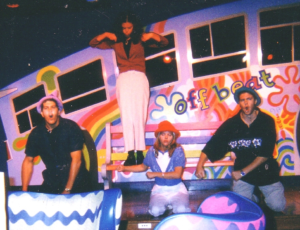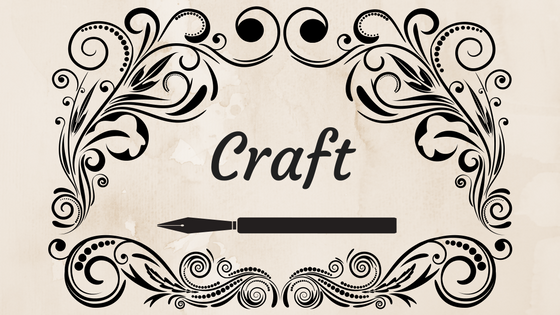by Billie Kelpin and Bethany Therese
No matter what genre we prefer as writers, humor in a character is a great draw to our readers. When I heard that this month’s theme of the OC Writers’ blog was “Jolly” my mind immediately leapt to my daughter, Bethany Therese. Because Bethany is an actor, singer, comedy improv performer, stand-up comic, and screen writer, I suspected she might have some insight into comedic writing. The following is a very short excerpt from that interview . . .
Thought Process
Billie: I’ve often wondered, Beth, what exactly is your mental process in comedic writing?
Beth: For me, because I come from writing through acting and improvising, my writing process changes depending on what kind of comedic thing I’m writing. For a funny script, I see the characters in my head, and they start talking to each other. When I’m writing jokes for stand-up, I start with an idea or an observation about myself in the world that is either good, bad, frustrating, weird or whatever. I take that idea and try to structure it in a way that will create a laugh. Then, I try out that something that I guessed was funny on an audience, and find out if I’m right.
A Workout for Your Funny Bone
Billie: Comedy, to me, requires flexibility of thinking. Do you have exercises that help improve flexibility?
Beth: I honestly think the best comedic exercise is observing conversations with people. I think that some very funny people walk around looking very serious, but that’s not what’s going on in their head. When I’m teaching an acting class, one of the first questions I ask is, “When you’re in conversation, do you often feel like there’s a ball in the air, and you just hit it, and then people laugh?” People who really do have that funny bone always answer “Yes” to that question.
Imagining a ball going back and forth in a conversation is a great way to gain a comedic sense. You don’t have to try to hit the ball yourself and say the funny thing; that takes courage. But if you practice seeing that moving ball and can say, “That’s where the moment is,” your comedic instincts will be heightened.
How to Make a Dramatic Scene become Comic
Billie: I know you’ve written several romantic comedies (rom-coms) as screenplays. How do you see the relationship between a dramatic scene and a comic scene?

Sometimes you have to stand on a bench for the laugh:
Bethany with the Dudley Riggs Comedy Improv Group on the Disney Magic Cruise Ship.
Beth: I look at that question this way. Drama exists on a single horizontal line. To do comedy, you put another line on top of it. Comedy is two things at once. If you’re not drawn to comedy organically, that’s ok. It’s a matter of knowing that drama is one line and to make that scene comedic, you put another line on top of it. For example: Let’s take a college-age girl and college age guy studying in the library. Let’s just talk about one aspect of that scene, “catching each other’s eye”.
The dramatic version of that scene is this:
She looks up from her book and he feels her looking at him, and he looks up. They lock eyes, and it’s a moment of being connected and knowing that “we like each other.” Then maybe both go back to reading, and then it happens one more time, and the scene continues.
The comedic version of that scene is this:
She looks up. He looks up, but right before their eyes meet, she looks back down. So he looks back down, then she looks up because she felt him looking up, but by that time, he’s looking down. Now they both look up and they both look down, and finally they lock eyes.
In the first scene we have a girl and a guy in library, and they have a connection.
The second is the exact same idea, but then we added on to that. Some other element happens, and that dramatic moment is turned on end, misinterpreted, or so on. You’re never abandoning what that moment is. It’s just flipped on its head.
How to Make a Character Funny
Billie: Writers often like to build comedy into a character to make a character more likable. How do we help our characters do or say clever things?
Beth: I think that writers, when forming characters, ironically, often forget that their characters are people! They forget to explore the level of funny their characters possess. It’s the whole “art reflects life” thing.
In this world, when you walk around and interact with people on a daily basis, you notice that there are a lot of stressed people, angry people, overly happy people, laid back people, and also a lot of funny people. There can be people who are funny all the time or people who are funny only sometimes. There are people who never say a funny thing and then one time they say something funny. Why can’t my character be funny all the time or only some of the time? Maybe he tries desperately to be funny, and then one time says something funny. Or he or she always tries to be funny and never is. You can factor all of that into an aspect of who that person is.
In general, I look at my character this way: My character can be in funny situations that are happening to her; the character is not necessarily funny herself, the situation is. Or my character can cause something funny to happen and knows that she’s causing it. My character can just say funny things. Maybe my character might even say something funny that they don’t know is funny, but it’s funny to another character or to the audience. There are a myriad of choices for a writer, no matter what the genre.
Billie: I may not have this humor thing locked down yet, but one thing I can say with certainty: if you interview your adult child about his or her profession, you’ll end up being very impressed, you’ll have a great deal of fun, and best of all, you’ll actually get to talk together on the phone for a whole hour!
***
Bethany Therese is a graduate of NYU’s Tisch School of the Arts. Her career has included Comedy Improv with “The Chainsaw Boys” in New York, the Disney Magic Cruise Ship, Flappers in Burbank, a two-year US Tour with the Broadway Production of “Mamma Mia,” Stand-up Comedy at the Ice House, Comedy Store, and various comedy clubs up and down the coast of California.
Billie Kelpin is a former teacher of the deaf, and sign language interpreter. She has written various short stories and essays that appear in publications including Lost Coast Review, Arizona Literary Magazine, Wanderlust.com, and Hubpages.com. She is embarking on her first novel, “If Not for War,” a coming of age story set during the Viet Nam War.
“I love OC Writers and appreciate not only the invaluable help and knowledge I receive, but the camaraderie and deep friendship I’ve gained through this group of generous and talented writers.”


I love this, Billie. I am impressed with BOTH of you. I am amazed at character analysis, not my forte. What strengths you both have.
Marcia, Thank you so much!
Great article! I learned something about comedic writing and acting.
Thank you, Patty. I’m so glad I have a daughter who continues to inform my choices in writing!
I thoroughly enjoyed this article. A mother and daughter connecting on a similar theme; character development through writing. Loved this!
Sue,
Of course when you said “a mother and daughter connecting on a similar theme,” you made my day!
Love the mother/daughter duo! Great tips.
Thanks, Greta. I hope you two can meet soon.
Great insights on humor and comedic writing Billie! Thanks for the post 🙂
Thanks Diane, my world-traveler friend.
Billie’s final comment is the happy ending everyone needs!
Hey PJ,
Regarding your comment on my “final comment”: As the character Edith Anne says, “And that’s the truth!”